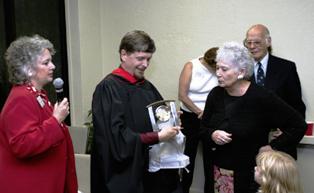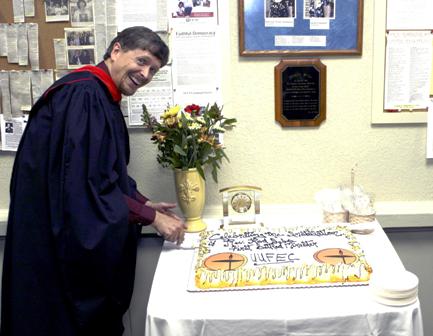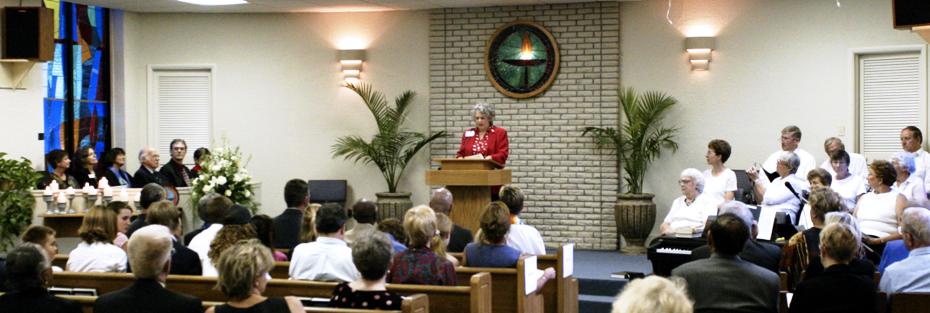
Installation of Rev. Rod Debs
at the UU Fellowship of the Emerald Coast
Valparaiso, Florida
October 10, 2004

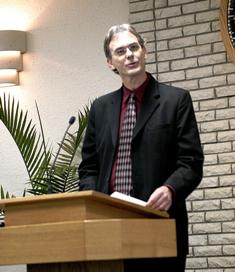 "Reaching
In and Reaching Out"
"Reaching
In and Reaching Out"
by Rev. Harlan Limpert, UUA Director for Congregational Services
I'm delighted to be with you today experiencing first hand the "southern
hospitality" that we hear about so often in my home town of Minneapolis,
Minnesota - the land of Garrison Keiller, Lutheran churches on every corner, hot
dishes, Jell-O salads, and wind chills of 60 degrees below zero.
I want to share warm greetings with all of you from the larger family of faith
that makes up the over 1000 congregations of the Unitarian Universalist
Association. The Unitarian Universalist Fellowship of the Emerald Coast is, of
course, a part of that family of faith.
And I send greetings from staff members in Boston, the headquarters of the UUA,
and from the thirty-five district staff members who work across the land to
serve our congregations.
I am so honored to be with: members and friends of this congregation who have
worked long and hard to get to this point today -- and I don't mean just in the
last 6 or 12 or 18 months, but since 1958 when your congregation was first
established; colleagues in the ordained ministry from this congregation and this
district clergy from other religious bodies and congregations. (Isn't it
remarkable to think that thirty or forty years ago, our being together for an
occasion like this may not have been a possibility?); family and friends and all
those who love Rod and who love this fellowship.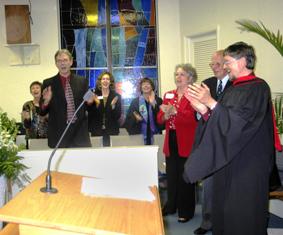
My role in the Association is to serve our congregations. I do that through my
work with thirty-five district staff members -- including your own Eunice Benton
and Laurel Amabile -- who work to help congregations remain healthy, thrive and
grow.
My role gives me the opportunity to visit congregations all over the country,
for all sorts of reasons. But there are few more exciting events in which to
participate than a "celebration of covenant" a ceremony that officially marks
the beginning of a new ministry. That is especially true when the celebration is
for the first settled minister of the Emerald Coast Fellowship, a title that can
only be given once!
Earlier in this celebration we heard a bit about covenants. Allow me to tell you
more.
If we take a minute to recall the history of our nation, we remember that the
pilgrims set out from England, via Holland, about 400 years ago upon the
Mayflower, the Arbella, and the other ships that followed. They embarked from
those shores on a quest, a quest for religious liberty. This "little band of
children and fools", as one person has called them -- 44 men, 19 women, 39
children, 102 persons in all -- set sail in a leaky little second-hand wooden
boat that was not much bigger than this sanctuary. They launched their small
boat in the fall of 1620, to seek a newer world. We sometimes forget that in
their first winter, over half of them died.
In many ways, the quest of the pilgrims was not very sensible. Practical
concerns alone would suggest they were crazy to do what they had done.
But, they were obsessed by a dream. And once on these shores, in places like
Plymouth, they formed autonomous, self-governing congregations that centered
upon what??? A covenant.
Now a covenant is not the same as a legal contract -- ink on paper. A covenant
is more of a promise -- a promise that originates in the heart. Like legal
contracts, the earliest covenants were written and signed by the members of an
individual congregation. But it was the heart, the intention, behind the page
that was most important, for as we all know, the heart is the source of all
relationships.
These early covenants were simple, often only a few sentences. Listen to these
phrases in the two-line Salem Church covenant: "We covenant together with the
Lord and with each other to walk together in God's ways, as God is pleased to
reveal unto us his blessed word of truth." These were simple, open-ended,
heartfelt promises.
And yet these simple covenants held them together. And while the use of the term
has ebbed and waned over the years, I have come to understand this "approach
from the heart" as one of the most powerful and deep ways of describing our
relationships to one another.
In the context of our congregations, a covenant conveys two things:
First, it conveys how we intend to relate to one another as members of a
religious community.
And second, it conveys how we agree to perform ministry in the larger world. And
by "ministry" I don't mean only the ordained ministry, but the various lay
ministries offered by the many members who serve the mission of the
congregation.
In a few minutes this congregations will, in a powerful and beautiful way,
verbalize the individual covenant you are making to one another -- you, Rod, and
the members of this congregation.
These are the words you will read: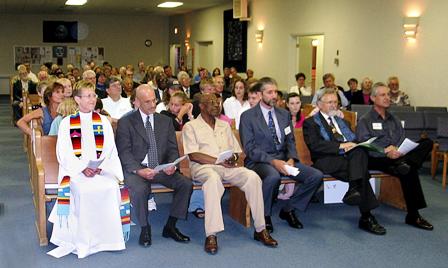
"We celebrate our shared Unitarian Universalist Ministry with Rod…"
But you will also make a covenant -- a promise, a commitment -- to the larger
community. The specific words are "We gather…recognizing that we also minister
our Unitarian Universalist values individually and collectively throughout our
community…"
It is that covenant, that promise to the larger community, that I wish to
explore with you. What is it you are promising to do together? What path are you
agreeing to walk? What, after all, is the larger purpose of this fellowship?
That is a broad and complex question which you, Rod, and you, the congregation,
must answer -- not me. But I raise the possibility that it needs to include a
broad vision of organized service and engagement outside this congregation and
with people of faith in other religious organizations within this city.
You see, I've had the opportunity to read your ministerial search packet. For
those of you not members of this congregation, a search packet is a document
that describes in great detail who the congregation is - what it's history is,
what its make-up is, what its hopes and dreams are. It was created some 18 or so
months ago as part of the process of searching for a minister to call.
Reading this packet, and your online newsletter of activities, I have a pretty
clear idea of what interests you, what drives you. It is clear. You want to
reach out. I am glad about that.
And here's why. Many things can drive a congregation, and they are not all
positive:
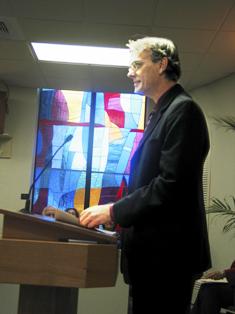 --
Some congregations - Unitarian Universalist and those of other religious
denominations -- are driven by tradition. The congregation's agenda for tomorrow
is determined by yesterday. Often they are concerned with what worked (or didn't
work) in the past, instead of what could work in the future. The goal of some of
these churches is to merely replicate the past.
--
Some congregations - Unitarian Universalist and those of other religious
denominations -- are driven by tradition. The congregation's agenda for tomorrow
is determined by yesterday. Often they are concerned with what worked (or didn't
work) in the past, instead of what could work in the future. The goal of some of
these churches is to merely replicate the past.
-- Some congregations are driven by sheer personality. The question those
congregations ask is "what does our leader want". If the leader is a skilled
leader of people, with a genuine sense of responsibility to the health and
welfare of the congregations, and a view of him or herself as a part of the
whole, then it may not be a problem. But heaven forbid the leader who is a
one-person show, someone who has his or her own agenda, someone whose vision of
community is incomplete, or worse yet, unhealthy. In congregations driven by
personality, when the religious leader leaves, church members leave, for the
community is seen as the leader, not the vision and the mission.
-- Some congregations are driven by their building. Winston Churchill once said,
"We shape our buildings, and then they shape us". We all know of such churches -
architecturally beautiful, known and loved throughout the community for their
majesty, often horribly expensive to maintain. I love beautiful churches. When
traveling, I often will seek out the most architecturally interesting church in
the area. But a congregation driven by its building is as unhealthy as a family
obsessed with its home or possessions.
-- Some churches are driven by budgets. In those churches or fellowships, the
question will always be "can we afford it" and never "what are we called to do?"
"What is our ministry in this larger community?"
-- Then there are churches driven by sheer activity -- programs, groups,
classes, calendars. In some congregations, it seems that its purpose is to fill
slots, keep people busy, and fill rooms. If one is not careful, it can become
chaos, a form of religious frenzy, and not a truly religious community. True,
often active churches ARE healthy churches -- but activity can be the "drug of
choice" for congregations that are out of touch with their deeper reason for
being.
-- And then, of course, there are "consumer driven" churches. These churches are
sometimes guilty of conducting surveys, focus groups, and market studies to find
out what their people want, what their congregants want - without necessarily
determining whether they are legitimate or not! These churches can become
"clubs" - meeting its own needs, but not that of the world.
-- And then, and then there are churches driven by a vision that is bigger than
itself. A vision that worthy of itself!
Every congregation needs to determine what drives it! Is it reaching in or
reaching out?
And I don't mean to imply by my list that buildings or budgets are foolish
things; of course not. But I find that the deepest, most spiritually rich
congregations, are driven by something deeper, something eternal. These churches
dare to reach out to the world beyond them, and serve, challenge, soothe,
organize and bless. The people want intimacy - a community - that's why many of
us join a church or fellowship to begin with. But they also want ultimacy - a
chance to find something that is of ultimate importance in life.
A book came out several years ago entitled, The Meaning of Life. A rather
pretentious title, wouldn't you say? The authors interviewed theologians and
taxi drivers and housewives and construction workers and students and ask them,
"What is the meaning of life?" I love this passage by Robert McAfee Brown from
the book:
I believe we are here to be companions, a wonderful word that comes from cum
panis ("with bread"). We are here to share bread with one another so that
everyone has enough, and no one has too much. There are many names for such
sharing: utopia, the beloved community, the Kingdom of God, the communion of
saints. And while the goal is too vast to be realized solely on this planet, it
is still our task to create foretastes of it on this planet - living glimpses of
what life is meant to be, which includes art and music and poetry and shared
laughter and picnics and politics and moral outrage and special privileges for
children only and wonder and humor and endless love, to counterbalance the
otherwise immobilizing realities of tyrants, starving children, death camps, and
just plain greed.
I have a theory. I believe congregations have developmental stages, like people.
Recall yourself as a teenager. (I know it's painful. I'm embarrassed, too, for
about a hundred different reasons). As teens the world was all about us. We
moved into our twenties and thirties -- times of productivity. In our forties we
began questioning, every once in a while, whether we are fulfilling our life's
purpose. When we hit our 50s and 60s and 70s most of us become more concerned
about our legacy. Able to see beyond the self-centeredness of our youth, more in
touch with our mortality, conscious of the fleetingness of life, we look for
something that will live beyond us, something that will endure.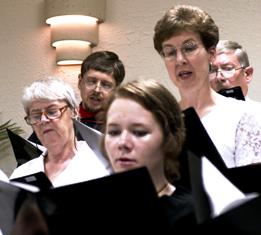
Rabbi Harold Kushner relays a story in his book, When All You've Ever Wanted is
Not Enough: A man in his mid-fifties attended the funeral of a co-worker, a man
about his same age, who had died suddenly of a heart attack. The people in the
office were devastated. This man was devastated? How could this happen? How
would the world, much less the office, survive without this absolutely essential
person who contributed so much?
A short four weeks later, someone new was sitting in the deceased man's desk.
How could that be?, wondered the man in his 50s? It was almost as if his friend
and colleague never existed? How is it his friend could be there one day, gone
the next, with hardly any indication that he had ever existed. That day the man
began thinking about his legacy. What would endure when he was gone?
If my theory about individuals and churches is correct, then this congregation,
rooted in a covenant first made in 1958, is well beyond its adolescence, beyond
its middle-age years, and well into the stage where it wants to explore what its
legacy will be. It wants to ensure that, looking back, it can say that it has
served something larger than itself. You already are. And you want to ensure
your fellowship will live beyond itself and any of you. What do you want its
legacy to be? What covenant will you make with Rod Debs today?
If you were to ask me for a definition of a great life, I would have to quote
Acts 13:36. It's the verse about David: 13:36 "David served God's purpose in his
generation." I don't know a better epitaph to have on a tombstone than to say
that you served God's purpose in your generation. You sought the enduring and
the eternal -- but you did so in a contemporary way, a way that fits today's
experiences and realities. That to me is the essence of a great life.
As individuals, we are not called to be Moses or Jesus or Mother Teresa or
Martin Luther King, Jr. We are called to be who we are, and to be no one else.
Congregations have that same challenge!
The Reverend Bill Sinkford, president of the Unitarian Universalist Association,
has spoken recently about how many members of our Association are evolving and
our congregations are evolving. At one time we took pride in being different
from those in other religious traditions. We wore it as a badge of honor to be
separate.
Now, largely because of the assault from the radical right (not the mainstream
Protestants or Catholics or Muslims or Hindus, but the radical extremes of these
groups), we are needing to build bridges, seek out alliances, create
partnerships where we can to make the world a better place. As Francis David
said, we need not think alike to love alike.
So UUs are joining hands with Catholics on economic justice issues, even though
we walk a different path on freedom of choice issues. There are hundreds of
examples of this cooperation across the nation.
One of the things I am not called to do is to garden. Its just not me. I love
looking at beautiful gardens. I just don't like WORKING in gardens.
Thankfully my wife does. For hours on end she'll "putz", which I think is the
Yiddish or maybe even scientific word for "planting, weeding, trimming, hoeing,
mulching, and all the other things gardeners do". In the meantime, I watch her
from my home office doing what I like best pondering how to change the world one
Unitarian Universalist congregation at a time.
I asked my wife one day, "What is it you like about gardening? Surely it's not
the dirt which can get caught under your nails for days, or the bugs, some of
which bite, or the weeds that seem to grow ever so much faster than anything
else."
"No," she says, stating the obvious, "I like to garden because they GROW. I love
to garden and delight in HOW they grow. There is a sense I get that something
wonderful is happening here."
I get a sense that something wonderful is happening here at the UU Fellowship of
the Emerald Coast. Growth. Delight. Beauty. Promise. And the fashioning of an
enduring and powerful legacy in the world. .
I wonder, how will you "serve your purpose in your generation"? Once the
promises of this beautiful covenant are kept for years and years, what your
legacy will be?
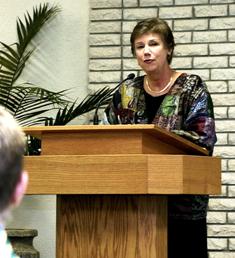 "Invocation
of Our Forbears"
"Invocation
of Our Forbears"
We light the Unitarian Universalist Chalice Flame invoking the memory of those
who have gone before. This Emerald Coast was once home to the Muscogee Indian
Nation known by European settlers as Creek Indians, the most recent, the Euchee
people.
We also remember our Unitarian forebears in Fort Walton Beach who gathered this
Fellowship in 1958, our founding parents Mac and Ann Piper, Roy and Suzanne
Bundy. We remember Lew Cartwright and Randy Williams, and the stalwart members
among us today, Millie Williams, Ron Alaire, and Roger Harris.
We remember clergy who have ministered with this Fellowship: Rev. Michael Seider,
a "circuit rider" from New Orleans; Rev. Harold Hawkins, part time; Rev. Roy
Phillips, Interim; Rev. Bob Eddy, part time; and Dr. Nels Oas, part time.
We remember a long line of clergy forebears who have gone before: Francis David
who said "We need not think alike to love alike"; scientist theologian Joseph
Priestley; Universalists John Murray, Hosea Ballou and Clarence Skinner;
Unitarians Charles Chauncy, Joseph Buckminster, William Ellery Channing, and
Joseph Tuckerman; Transcendentalists Ralph Waldo Emerson and Theodore Parker;
humanists Curtis Reese and John Dietrich; women
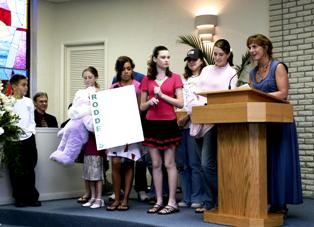 clergy
Olympia Brown and Antoinette Brown Blackwell, and thousands more, living and
dead---our clergy forbears.
clergy
Olympia Brown and Antoinette Brown Blackwell, and thousands more, living and
dead---our clergy forbears.
We also remember non-clergy Unitarians and Universalists reaching back to martyr
Michael Servetus, the farmer Thomas Potter; patriots Benjamin Franklin, Abigail
Adams, Clara Barton and Samantha Smith; physicians Benjamin Rush, Albert
Schweitzer and Linus Pauling. Our non-clergy forbears include transcendentalists
Henry David Thoreau and Margaret Fuller; literary giants Charles Dickens, Louisa
May Alcott, William Cullen Bryant, Robert Burns, Nathaniel Hawthorne, Henry W.
Longfellow, Herman Melville and e.e. cummings; abolitionist Lydia Marie Childs;
suffragists Lucy Stone, Mary Livermore and Susan B. Anthony; orator Daniel
Webster; jurists Jeremy Bentham, John Marshall and Oliver Wendel Holmes;
educators Dorothea Dix and Horace Mann; inventors Samuel Morse and Alexander
Graham Bell; reformers Robert La Follette, Adlai Stevenson, and Whitney Young;
and United States Presidents John Adams, Thomas Jefferson, John Quincy Adams,
Millard Fillmore and William Howard Taft.
These lay-persons are also our forbears who ministered Unitarian Universalist
values, and they changed the world. May the faithful spirit of our forbears,
clergy and non-clergy alike, bind us together in a partnership of ministry in an
ever-broadening Unitarian Universalist movement into the future.
Blessed be.
 "Charge
to Minister"
"Charge
to Minister"
This Charge to the Minister was
written by my father, Rev. Harold Hawkins . . . who wishes he could be here
today.
Dear Rod:
First, be yourself. That really is all you have, and any effort for whatever
reason to be anything else is violence to your integrity; and integrity is the
essence of a good minister.
A spoken word is very powerful for good and for bad results; therefore I hope
you will memorize and heed Voltaire's famous philosophy - "Speak only when you
think you can improve upon the silence."
Become a teacher in your ministry. Teaching is the noble profession and if your
preaching is not also teaching you have failed to influence the minds of your
listeners.
Love learning yourself -- for sheer pleasure, for sermon preparation, for
serious conversation, and for spiritual development.
I charge you to Be Strong: Do not fail to point out false doctrine, nor be
afraid of those who differ by saying that you can believe anything and be
faithful to the UU stream of religion and culture; and be strong to
 require
more of your members and those who want to join. If UU'ism is worth anything, it
is worthy to require its members commitment to its cause. I have belonged to
hundreds of organizations and every one of them require a fee for membership -
even the Minister's Association. The way of life that requires nothing from us
is false and unworthy of UU'ism and its members. We are last on the list when it
comes to giving to our churches, and that indicates the level of our commitment,
and explains why we have so many small fellowships and have so few churches.
Therefore I urge you to teach your people how to give their money and their time
to the Fellowship.
require
more of your members and those who want to join. If UU'ism is worth anything, it
is worthy to require its members commitment to its cause. I have belonged to
hundreds of organizations and every one of them require a fee for membership -
even the Minister's Association. The way of life that requires nothing from us
is false and unworthy of UU'ism and its members. We are last on the list when it
comes to giving to our churches, and that indicates the level of our commitment,
and explains why we have so many small fellowships and have so few churches.
Therefore I urge you to teach your people how to give their money and their time
to the Fellowship.
I further charge you to find some one person who really values UU'ism and has a
great grasp of human nature and who loves you and the ministry enough to be your
evaluator; now you don't have to look for critics for there may be many around,
but an evaluator is so necessary for you as minister. We are prone to be blind
to ourselves so often, and once every 6 months or a year is time to get with
your evaluator -- to ask for and receive a mirror view of your life and
performance. A committee won't do. One to one is necessary -- with no holds
barred.
Finally, know your people and they will love you and you will love them. Laugh a
lot and cry when necessary. Plan a long ministry for knowing people takes time
and patience. Plant some trees and watch them grow; Share what you have with
your people -- and you can be known as a shepherd. My best wishes to you and
your people -- for they are mine also."
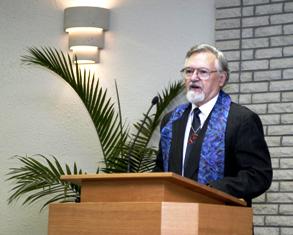 "Charge
to Congregation"
"Charge
to Congregation"
by, Rev. Bob Eddy
Marriage is often suggested as a model for the relationship between a minister
and congregation. In past centuries that would have brought a patriarchal model
to mind. Today we live in more enlightened times. We believe in companionate
marriage – a relationship that enhances the quality of life and the growth of
both partners. Modern marriage is not about power but fulfillment. So too with
the partnership between minister and congregation. However, it may be that
marriage is not the best model. Maybe wine making is a better model. Maybe the
minister is like the owner of a vineyard - who usually gets credit – or blame –
for the vintage but is really completely dependent on the quality of the vines,
the weather, the workers in the vineyard.
Perhaps there is no model that’s adequate. Perhaps not even the experience of
other ministers and congregations is a good guide to your new relationship.
Nevertheless, let me go back to the very first time I spoke in this building.
The sermon was titled : Professional Ministers: Necessity, Luxury or Snare? The
answer I gave was, "none of the above." I said then and I remind you now that a
minister adds to what’s already happening in your fellowship; he does things
than none of you can do– or at least none of you can do as well. The three
things I thought then and think now a minister can do better than any lay member
of the congregation are to be
1. A preacher/pastor.
2. A speaker for the dead and
3. The "Alpha Baboon."

Preacher/Pastor Let your minister, when he stands up here cajole, persuade,
challenge, and comfort you AS HE SEES FIT. This piece of furniture belongs to
him so long as he is your minister. That’s what our freedom of the pulpit means.
You may disagree with what he says but I hope you will defend his right to say
honestly and forcefully what he, in his heart of hearts, believes to be true.
Speaker for the dead: Don’t consider yourself an expert on the tradition to
which we belong. He has spent long years studying our movement’s history and
observing it’s myriad manifestations in the thousand congregations that today
call themselves Unitarian and/or Universalist. You may know what’s normative in
your experience. He is the expert in the whole field of Uuism past and present.
We do NOT "make it up as we go along." Ours is a living tradition, but it is
nevertheless a tradition. Finally, don’t begrudge your minister his function as
"alpha baboon." It’s not easy trying to get talented and opinionated and strong
individuals to follow – but that’s his job: to lead; not by intimidation or
shaming or manipulation – but by persuasion He can’t force you but he must do
his best to inspire you – never against your collective will – but always
against the will of at least one member of the congregation. Never give any
individual member the power to frustrate his leadership. Never let a small
minority of members frustrate the will of the clear majority. The relationship
of minister and congregants, if it blessedly lasts many years becomes almost as
intimate as marriage. If you love Rodney as well as you loved me in my brief
time as your minister, he will be fortunate indeed. There is much more I could
say, but my five minutes are up. I thank you for bringing a colleague of such
quality as Rodney Debs to the professional Unitarian Universalist ministry here
in "the redneck Riviera."
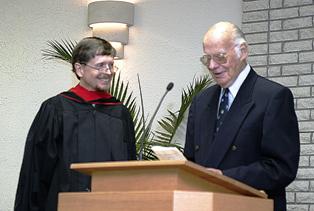 "Act
of Installation"
"Act
of Installation"
John Bacon, UUFEC Board President
PRESIDENT: We gather today to covenant with Rod Debs as the Called Minister of
this Fellowship. We celebrate our Shared Unitarian Universalist Ministry with
Rod, recognizing that we also minister our Unitarian Universalist values
individually and collectively both here and throughout our community.
Rod, we have chosen and called you to live among us, to make our concerns your
concerns, and to collaborate with us in the ministry of this congregation. Our
desire is to find wholeness among ourselves and to create relationships of
mutual wholeness in our community and out into the world.
We would have you speak the truth in love. We would have you model wisdom and
kindness to our children and youth. We would have you minister to us in times of
joy and in times of sorrow. We would have you demonstrate by your example as
well as by your words, the life of courage and compassion. We would have you
nurture our movement toward greater service to the world. Are you willing to
take up these shared responsibilities?
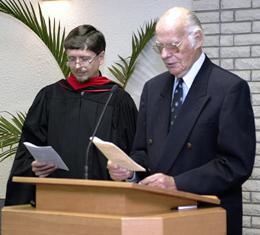
MINISTER: I am.
PRESIDENT: On our part, we pledge to remember that the work of Unitarian
Universalist Fellowship belongs to all of us. We pledge to honor freedom of
conscience in both pulpit and pew. We share responsibility with you for the
spiritual development and the material welfare of our Fellowship. As we would
ask you to be charitable toward our failures, we will also remember that you are
human too. We pledge to participate and to cooperate with you in our growth
toward an ever-expanding community of caring.
Will the members please stand and join me in the Covenant of Shared Ministry:
MEMBERS: We, the members of the Unitarian Universalist Fellowship of the Emerald
Coast, commit ourselves with Reverend Debs to collaborate in fulfilling the
goals of this Fellowship. We hereby install Rod Debs as our Called Minister and
pledge our partnership in ministering Unitarian Universalist values in our
community and beyond.
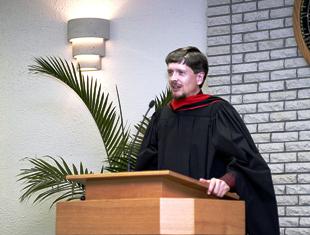 MINISTER:
I accept the shared Ministry to which you have called me. I pledge to honor the
freedom of pulpit and pew, to speak with integrity and love both publicly and
privately, diligently to fulfill the various offices of spiritual leadership,
counsel, celebration, religious education, activism and administration. I pledge
to promote mutual relationships of justice and kindness among all people, with
ourselves, and within nature as articulated by our Statement of Unitarian
Universalist Principles. This is my covenant with you.
MINISTER:
I accept the shared Ministry to which you have called me. I pledge to honor the
freedom of pulpit and pew, to speak with integrity and love both publicly and
privately, diligently to fulfill the various offices of spiritual leadership,
counsel, celebration, religious education, activism and administration. I pledge
to promote mutual relationships of justice and kindness among all people, with
ourselves, and within nature as articulated by our Statement of Unitarian
Universalist Principles. This is my covenant with you.
"The Celebration!!!"

